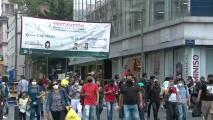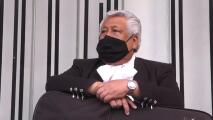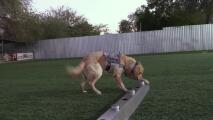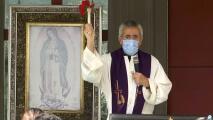The Obama effect in Cuba: has anything changed?
HAVANA – During a March visit to Cuba, First Lady Michelle Obama took her daughters for lunch at one of Havana’s increasingly popular private restaurants.
For the restaurant she chose, Atelier, on a quiet pot-holed street in the Vedado district, the recognition was priceless.
“It was a big surprise for us. It was all over the media and the internet and our clientele has increased,” said Alexander Vega, Atelier’s doorman.
“But more than that it was a symbol of hope for all the Cuban people,” he added. “We have been hearing about changes for a long time, but a lot of people were doubting. When he came we could see it was serious,” said Vega, 42.
While Atelier, and other sites graced by the Obama family, have seen a boost, for most Cubans the jury is still out on the impact of the first official visit to the island by an American president in 80 years.
Six months on, most Cubans are still waiting to see any concrete benefit from the historic presidential trip, which included two speeches by Obama encouraging Cuba’s communist leaders to allow more space for a budding private sector, including the private restaurants, known as ‘paladares.’ Cuba’s cottage industry of mostly home-based restaurants get their name from the Spanish word for “palate.”

Besides the tourism sector, it's also been pretty slim pickings for U.S. corporations looking to invest in Cuba.
While some of the gloss has rubbed off, many Cubans still refer to the visit optimistically as a watershed moment that at the very least marked an irreversible improvement in relations between the two countries, former Cold War enemies divided only by a narrow stretch of sea.
As American tourists stepped off a cruise ship from Miami recently they were smothered in kisses from Cuban women dressed in colorful traditional rumba dresses. Photos were taken and a few dollars exchanged, a scene unthinkable even a few months ago.
Yureidys Rodriquez, 40, greets tourists in a plaza in Old Havana with a practiced cry in quaintly accented English. “Cuba dollies, black and white!”
Her multi-racial handmade dolls, which she makes at home with her aunt, are a hit with the steady stream of tourists who stroll the plaza, a must-see in the colonial Habana Vieja (Old City) district.
Most of the tourists hail from Europe or Latin America, but Rodriguez says more and more Americans are showing up. “We’d like to see more of them. That’s what we are all hoping for,” she said.
There is no question after the Obama visit that Cuba has turned its sights on the United States as a lifeline for its economy. It would appear that Cuba has little choice as Venezuela spirals deeper into chaos, putting in doubt a nearly two-decade old political alliance that guaranteed plentiful cheap oil and roughly $2 billion in revenue from the sale of Cuban medical and educational services.
But for many Cubans the much desired changes are too slow in coming. “We thought they would come quickly and so far we haven’t seen any changes,” said Yosel Betancourt, a 37-year-old bicycle taxi driver in a t-shirt and shorts hunting for clients to offer a ride in Havana’s Central Park, where Obama made a keynote speech March 22.
“At the end of the day what people need is for the doors that are closed to open so that the people can have a better life. That’s what we want,” said Betancourt, who complained he didn’t have the money to buy his daughter a backpack and water bottle for the new school year.
At this time of year Havana’s unrelenting heat and humidity, broken only by torrential thunderstorms, is always a test of patience for a long-suffering population mostly not equipped with air conditioning. There’s a saying in Cuba that there are only two seasons, “summer and hell,” one Cuban official commented over a refreshing lemonade frappe.
September is hell.
Power cuts in July caused a brief panic and fears that the country was on the verge of plunging back into a notorious Special Period in the 1990s of dire shortages as Cuba grappled with economic collapse of its longtime ally, the former Soviet Union. President Raul Castro was quick to reassure Cubans that while fuel shortages were an issue, there would be no power cuts in residential areas. Instead, government offices were ordered to close early to save energy.
While many Cubans privately harbor strong feelings bordering on anger about the need for improvements to their quality of life, in public they tend to be more stoic about the pace of change. Rusbelt Quignon, 37, stood nearby next to a gleaming 1955 Cadillac El Dorado convertible waiting to give a ride to a tourist. “People made high expectations that when Obama came everything would open up completely. It’s not like that,” he said.
“People are desperate for change, but as we say in Cuba you have to have faith, and hope, and a lot of patience … there have been small changes, not a lot. It’s slow going, but it can’t be too quick. A rapid change could be catastrophic,” he added.
To be sure, Cuban president Raul Castro faces a delicate balancing act as he seeks to move forward with a series of tentative market reforms, gradually distancing his government from the staunchly socialist policies of his older brother, Fidel Castro, who stepped down due to illness ten years ago. Castro has repeatedly told Cubans that change will be “slow but steady” (“sin prisa, pero sin pausa”), in what experts say is a carefully calculated effort aimed at a soft landing as Cuba’s economy transitions away from the straightjacket of its 55-year-old centrally planned socialist model.
Castro’s reforms have run into opposition by hardline conservatives within the Cuban Communist party, insiders say. “Before Obama arrived the conservative forces were trying to delay the process. They didn’t like Obama’s visit at all,” said Carlos Alzugaray, a retired Cuban diplomat in Havana.
Obama's visit threw the hardliners a curve. “They prefer the old fight against the imperialist enemy than the soft power of Obama,” said Alzugaray. “So, there was a reality check by Raul. Now it’s a holding pattern,” he added.
That has left many wondering: In what political direction is Cuba headed? It’s a question that has bedeviled Cubans since the 1990s, even prompting Cuban troubadour Silvio Rodriguez to sing: “No one knows what this thing communism is.” (“Nadie sabe qué cosa es el comunismo,” – Reino de Todavia,1994).
While Cuba is actively seeking foreign investment, especially in its tourist sector, it has rebuffed investment in other areas such as internet technology. The Cuban Communist Party shows no signs of ever allowing a multi-party democracy. Most Cubans seem willing to accept this Chinese model, as long as living conditions begin to improve.
Fidel Castro, who turned 90 in August, is now fully retired, and Raul Castro is due to step down as president in 2018, though he was re-elected in April for another five years as head of the Communist Party.
No one was more enthused by Obama’s visit than Cuba’s small but growing private sector, tightly controlled by a system of state licenses. But the praise heaped on them by Obama, especially the “inventiveness” of classic car restorers, paladar owners and internet entrepreneurs, came with a price.
Most prefer to keep their heads down rather than attract too much attention from authorities as they quietly seek to test the tepid waters of Cuba’s fledgling market economy.
Yondainer Gutiérrez, co-founder of A la Mesa, an internet application for dining out in Cuba, says he doesn’t focus on the obstacles to his new business, such as lack of mobile internet access in Cuba. “There is a lot to do,” said Gutiérrez, 29. “We try to find solutions to the problems that face us and not spend our time lamenting what we can’t do because we don’t have internet or because we don’t have this or that.”
Luis Dueñas, president of a fast-growing private accounting cooperative in Havana, Scenius, says Cuba’s uncertain future can be interpreted in different ways. “The pessimist complains about the wind, the optimist expects it to change, the realist adjusts the sails,” he said quoting a famous American author of proverbs, William Arthur Ward.
In a groundbreaking enterprise for Cuba, Scenius runs a team of 190 accountants providing services to both the private and state sectors. Dueñas, a former naval engineer, began the business in his house two years ago. Accounting wasn’t exactly what he had in mind when he decided to join the private sector ranks. But it was the only license he could obtain. “The permits are according to what the state needs, not what people want to do,” he said.
He’s an optimist, so while he’d like to see things move a bit faster, he recognizes Cuba’s private sector is still in its infancy. "We’re like children whose parents let them go to the movies, but they tell you ‘come home early,’” he said.
Atelier is now firmly on the 'paladares' tourist map. Its elegant dining room now attracts a regular crowd of foreigners – including American diplomats – as well as well-heeled Cubans. As Atelier and Havana’s other tourist attractions gear up for the tourist boom, the restaurant’s doorman says he hopes other Cubans get to benefit too.
“First, we all want to see the elimination of the embargo,” said Vega, a former interior ministry officer. “That would be a big fiesta for every Cuban,” he added. “And we’d also like to see more evidence from our government. The Americans are doing their part. Now what’s lacking is from our side.”



